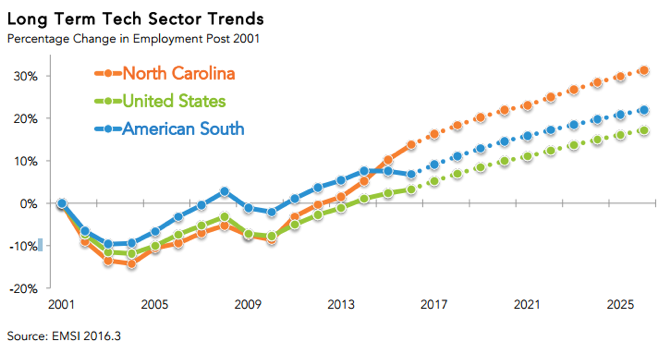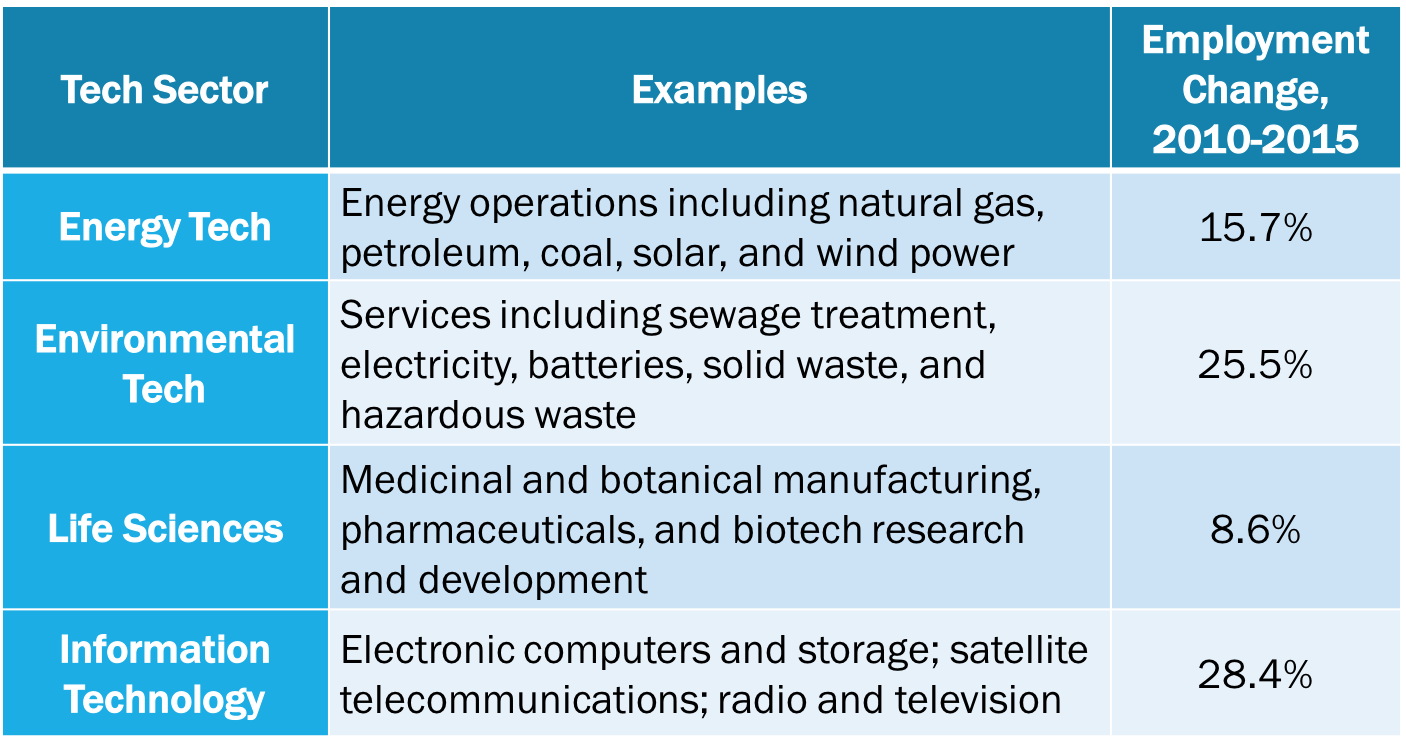|
|
Student Corner: The State of Technology in North CarolinaBy CED Program Interns & StudentsPublished February 21, 2017
The tech sector has been remarkably robust of late and has been a boon for the North Carolina economy. Not only was the average salary per tech worker $110,000 in 2015, it was almost twice the average salary for all industries in NC. The tech industry is estimated to make up approximately 20 percent of North Carolina’s economy in terms of employees, earnings, and sales. Another staggering figure to wrap your mind around is for every job created in the technology industry, another two jobs are supported across all industries are supported in NC, at least according to the North Carolina Technology Association (NCTA). The short- and long-term trends for North Carolina highlight the tremendous opportunity and growth that North Carolina has in store if the trends continue.  Four sub-sectors make up the tech sector: energy, environmental, life sciences, and information technology (IT). IT by far dominates the tech industry in terms of employment, establishments, and sales making up over 50 percent of the almost 240,000 tech employees. What is tech though more specifically? That last sentence included the 14th use of the word tech in this blog post so far (15 now), but the following table will hopefully illuminate this nebulous category of tech. Comparison to other states Despite higher growth in the tech sector across the United States, the proportion of tech to non-tech employees in North Carolina (6:94) is lower than other states studied in the report including California, Texas, and Virginia that are all at 8 percent or above. This potentially indicates that North Carolina’s economy is more diverse, yet even that tech proportion is still expected to grow indicating future job growth. Not only is that expected to grow, median hourly earnings for tech jobs adjusted for purchasing power ranks 7th in the country! Room for Growth Where there is room for growth in comparison to other states is research and development, patents, and the amount of venture capital funding providing financing for additional growth and start-ups in North Carolina. However, with North Carolina’s strength in higher education institutions, lower average in-state tuition, and high-speed broadband, there is room for optimism and continued growth rates. Even if the NCTA’s growth trends are too optimistic, the tech industry is likely here to stay as it has clearly grown and is still growing in North Carolina. Omar Kashef is a third-year graduate student seeking a dual-degree in Public Administration and Information Science and is currently a Fellow with the Development Finance Initiative. |
Published February 21, 2017 By CED Program Interns & Students
 The North Carolina Technology Association (NCTA) recently published the 2017 State of the Technology Industry Report providing interested stakeholders an in-depth review of North Carolina’s technology industry. The following blog post will provide a snapshot of the report that is available for download on NCTA’s site here.
The North Carolina Technology Association (NCTA) recently published the 2017 State of the Technology Industry Report providing interested stakeholders an in-depth review of North Carolina’s technology industry. The following blog post will provide a snapshot of the report that is available for download on NCTA’s site here.
The tech sector has been remarkably robust of late and has been a boon for the North Carolina economy. Not only was the average salary per tech worker $110,000 in 2015, it was almost twice the average salary for all industries in NC. The tech industry is estimated to make up approximately 20 percent of North Carolina’s economy in terms of employees, earnings, and sales. Another staggering figure to wrap your mind around is for every job created in the technology industry, another two jobs are supported across all industries are supported in NC, at least according to the North Carolina Technology Association (NCTA). The short- and long-term trends for North Carolina highlight the tremendous opportunity and growth that North Carolina has in store if the trends continue.

Four sub-sectors make up the tech sector: energy, environmental, life sciences, and information technology (IT). IT by far dominates the tech industry in terms of employment, establishments, and sales making up over 50 percent of the almost 240,000 tech employees. What is tech though more specifically? That last sentence included the 14th use of the word tech in this blog post so far (15 now), but the following table will hopefully illuminate this nebulous category of tech.
Comparison to other states
Despite higher growth in the tech sector across the United States, the proportion of tech to non-tech employees in North Carolina (6:94) is lower than other states studied in the report including California, Texas, and Virginia that are all at 8 percent or above. This potentially indicates that North Carolina’s economy is more diverse, yet even that tech proportion is still expected to grow indicating future job growth. Not only is that expected to grow, median hourly earnings for tech jobs adjusted for purchasing power ranks 7th in the country!
Room for Growth
Where there is room for growth in comparison to other states is research and development, patents, and the amount of venture capital funding providing financing for additional growth and start-ups in North Carolina. However, with North Carolina’s strength in higher education institutions, lower average in-state tuition, and high-speed broadband, there is room for optimism and continued growth rates. Even if the NCTA’s growth trends are too optimistic, the tech industry is likely here to stay as it has clearly grown and is still growing in North Carolina.
Omar Kashef is a third-year graduate student seeking a dual-degree in Public Administration and Information Science and is currently a Fellow with the Development Finance Initiative.
Author(s)
Tagged Under
This blog post is published and posted online by the School of Government to address issues of interest to government officials. This blog post is for educational and informational Copyright ©️ 2009 to present School of Government at the University of North Carolina. All rights reserved. use and may be used for those purposes without permission by providing acknowledgment of its source. Use of this blog post for commercial purposes is prohibited. To browse a complete catalog of School of Government publications, please visit the School’s website at www.sog.unc.edu or contact the Bookstore, School of Government, CB# 3330 Knapp-Sanders Building, UNC Chapel Hill, Chapel Hill, NC 27599-3330; e-mail sales@sog.unc.edu; telephone 919.966.4119; or fax 919.962.2707.


